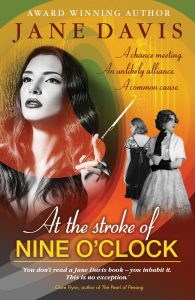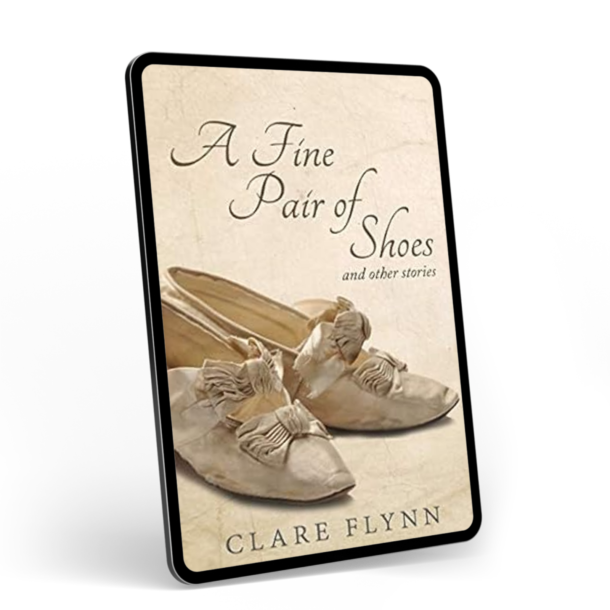It’s always a pleasure to talk to Jane Davis. Jane was hailed by The Bookseller as ‘One to Watch’, and is the author of nine thought-provoking novels. She was last year’s winner of the Selfies Book Award for her fabulous Smash All the WIndows (the one I won this year) and I am a big fan of her writing. No stranger to winning prizes, she was the winner of the Daily Mail First Novel Award 2008 for Half-truths & White Lies and her 2015 novel, An Unknown Woman, was Writing Magazine’s Self-published Book of the Year 2016 and has been shortlisted for two further awards. A new book by Jane is always something to look forward to and I was honoured to have been invited by her to offer a quote for the cover. I’m thrilled to have read and advance copy of At the Stroke of Nine O’Clock and can say it is a cracking read (my cover quote is “You don’t read a Jane Davis book, you inhabit it. This is no exception” and that is certainly true.
Welcome back to the blog, Jane! Can you start by telling us about the inspiration for your new novel At the Stroke of Nine O’Clock?
 It’s the result of a long-held fascination with Ruth Ellis, the last woman to be hanged in Great Britain. I was only a teenager when I was hooked by the story of the blonde hostess, who took a gun, tracked her errant racing-boy lover down to a public house in Hampstead, shot him in cold blood, then calmly asked a bystander to call the police.
It’s the result of a long-held fascination with Ruth Ellis, the last woman to be hanged in Great Britain. I was only a teenager when I was hooked by the story of the blonde hostess, who took a gun, tracked her errant racing-boy lover down to a public house in Hampstead, shot him in cold blood, then calmly asked a bystander to call the police.
But the book project really began with a televised documentary about the actress Ingrid Bergman. Left wanting more, I ordered her autobiography and a biography (I always go to at least two sources if I can). By coincidence rather than design, I followed this with two other biographies about women who lived through the fifties – and each had an association with or an anecdote to tell about Ruth Ellis. I’d stumbled on something, or so it seemed. Ruth Ellis was a complicated, controversial and divisive character, but everyone had an opinion about her, and most people who lived through the fifties seem to be able to pinpoint exactly what they were doing on the day she died. Without prompting, my copy-editor was able to tell me which football match he was at and what the final score was.
How does At the Stroke of Nine O’Clock fit in with your other books and how does it differ?
After what was my most contemporary offering to date (Smash all the Windows) I’ve stepped back in time to 1950s Britain, into one of London’s afternoon drinking clubs. Think black-market supplies, illegal gaming and illicit affairs. Few other places offered the opportunity for ex-servicemen and bored businessmen to rub shoulders with a roll-call of royalty, politicians, intellectuals, journalists, celebrities and gangsters. It seemed the ideal venue for my three main characters to meet.
The book has some elements my beta readers said they recognised from my other novels. We have multiple points of view, for example. It was only yesterday when answering a question about the book that I realised, although this is a very different book to my last release, Smash all the Windows, the approach I took was much the same. Smash all the Windows came about as my reaction to the result of second inquest to the Hillsborough Disaster, but you have to tread so carefully if relatives of victims are still alive. I asked myself, what could I add to the range of material that had already been produced, if a fictional account would be welcome, and what right I had to tell the story? My decision was to create a fictional disaster to explore the issues faced by the Hillsborough families.
I had similar concerns about writing Ruth Ellis’s story. Because I set myself the rule of only using information that would have been known to the public at the time of her death – in reality this was very little – I used three very different female characters to explore the issues she faced. My idea was that when they learned of her fate, each would have their own reason to say, ‘There but for the grace of God.’
Tell us a little about those women. (Gorgeous cover by the way! – Ed)
 My character whose trajectory most closely follows Ruth’s is seventeen-year-old Caroline Wilby. Like most working-class daughters, she’s expected to help support her family. For her this means leaving her family and everything she knows behind. Alone in a strange city, she must grab any opportunity that comes her way, even if that means putting herself in danger. She’s our direct route into the world of afternoon drinking clubs, where hostesses must use their powers of persuasion and feminine wiles to part male customers from their money.
My character whose trajectory most closely follows Ruth’s is seventeen-year-old Caroline Wilby. Like most working-class daughters, she’s expected to help support her family. For her this means leaving her family and everything she knows behind. Alone in a strange city, she must grab any opportunity that comes her way, even if that means putting herself in danger. She’s our direct route into the world of afternoon drinking clubs, where hostesses must use their powers of persuasion and feminine wiles to part male customers from their money.
Then we have star of the silver screen Ursula Delancy, who we meet when she’s just been abandoned by the man she left her husband and child for. Already hounded by the press, she’s soon making headlines for all the wrong reasons. Like Ruth, Ursula is pre-judged by those who think they know her simply because they’ve read about her in the press. And, like Ruth, Ursula appreciates all too keenly that it’s impossible to tell your side of a story without hurting those you love.
Making up my trio is Patrice Hawtree, a duchess, who was among the most photographed debutantes of her generation. In middle age she finds herself childless and trapped in a loveless marriage, and her plans to secure the future of her ancient family home are about to be jeopardised by her husband’s gambling addiction.
Although the three don’t actually suffer Ruth’s fate, lied to and exploited by men, each finds a way to fight back. But this is the fifties. Defy society’s expectations, and one must pay the price.
In the dramatisation of the novel, who would your fantasy cast include?
I’m going to start with Patrice Hawtree. Fiona Shaw would be perfect. Nobody is more British at the moment. And if she’s not available, Dame Harriet Walker, who also starred in Killing Eve, but I saw last night in one of Alan Bennet’s Talking Heads. (Great Choice! – Clare)
And since this is a fantasy cast, I shall have Ruth Wilson for Ursula Delancy. I loved her as Mary in Poliakoff’s Capturing Mary, and had the great privilege of seeing her on stage as Karin in Through a Glass Darkly. She never fails to be anything short of utterly mesmerising. (Perfect!)
As for Caroline, I’d want someone who’s the right age. Mirren Mack gave a superb performance in The Nest and I think she has a lot more to give.
Is there a story behind the title?
Nine O’Clock was the hour when executions were carried out in the UK, and I knew that was the unavoidable ending I was working towards. I thought there would be a nice symmetry in having the book begin and end with the chimes of Big Ben, but then I discovered that there was an occasion in August 1949 when Big Ben failed to chime. This caused widespread panic. People thought that World War 3 had broken out – at the time a very real fear – or that the king or the prime minister must have died. And a moment of disruption makes for a much better beginning.
One of the unspoken questions you address is whether women get a fair deal in the criminal justice system.
When Ruth Ellis’s case was brought before the court of appeal in 2003. The conclusion reached was that Ruth Ellis was judged by the law as it stood at the time. That may be true (the partial defence of diminished responsibility wasn’t introduced until 1957), but shouts of ‘common tart’ were heard as she entered court number one at the Old Bailey. The judge found it necessary to repeatedly tell to the jury not to concern themselves with adultery or sexual misconduct; that Ruth Ellis was not being tried for immorality but for murder; that they shouldn’t allow their judgement to be swayed or their minds prejudiced in the least degree because, by her own admission, Mrs Ellis was a married woman when she committed adultery, or because she was having affairs with two different lovers. It’s impossible to imagine similar comments being made had a man been on the stand. And so it does seem that women are judged by very different standards. Dual standards. And the further a woman steps away from the traditional image of the female nurturer and homemaker, the harsher that judgement is.
Speaking in 2019 about the case of Sally Challen (Sally murdered her husband of over 30 years), human rights lawyer Harriet Wistrich said, ‘The law doesn’t work well for women in relation to issues of violence. If a woman fights back, they are often punished more severely than a man that’s violent.’ It’s often argued that had the partial defence of diminished responsibility been available in 1955, Ruth Ellis would have been convicted of manslaughter rather than murder, but Sally’s case shows us that this outcome wouldn’t have been guaranteed. As at Ruth’s trial, the full story didn’t come out in court. Aware that their mother had suffered at her husband’s hands, Sally’s family challenged her defence team why the matter of their father’s behaviour wasn’t raised. They were told, ‘Speaking ill of the dead doesn’t go down well will the jury’, a sentiment echoed by the Crown Prosecution Service’s representative: ‘It’s not Mr Challen who’s on trial. The fact that someone was incredibly cruel and abusive towards their partner is not on its own a defence to murder.’
At the Stroke of Nine O’Clock will be released on 13 July, but is available for pre-order at £1.99/$1.99. (Price on publication £4.99/$4.99). The Universal Link is https://books2read.com/u/brWppZ
Here’s the blurb for the book
London 1949. The lives of three very different women are about to collide.
Like most working-class daughters, Caroline Wilby is expected to help support her family. Alone in a strange city, she must grab any opportunity that comes her way. Even if that means putting herself in danger.
Star of the silver screen, Ursula Delancy, has just been abandoned by the man she left her husband for. Already hounded by the press, it won’t be long before she’s making headlines for all the wrong reasons.
Patrice Hawtree was once the most photographed debutante of her generation. Now childless and trapped in a loveless marriage, her plans to secure the future of her ancient family home are about to be jeopardised by her husband’s gambling addiction.
Each believes she has already lost in life, not knowing how far she still has to fall.
Six years later, one cause will unite them: when a young woman commits a crime of passion and is condemned to hang, remaining silent isn’t an option.
“Why do I feel an affinity with Ruth Ellis? I know how certain facts can be presented in such a way that there is no way to defend yourself. Not without hurting those you love.”
Find out more about Jane.
Read my past interview with Jane on here (yes I am a fan!) https://clareflynn.co.uk/blog/author-interview-jane-davis
Check out Jane’s website: https://jane-davis.co.uk
Follow her Facebook page: https://www.facebook.com/JaneDavisAuthorPage
Jane always has super interesting tweets! Twitter: https://twitter.com/janedavisauthor


0 Comments